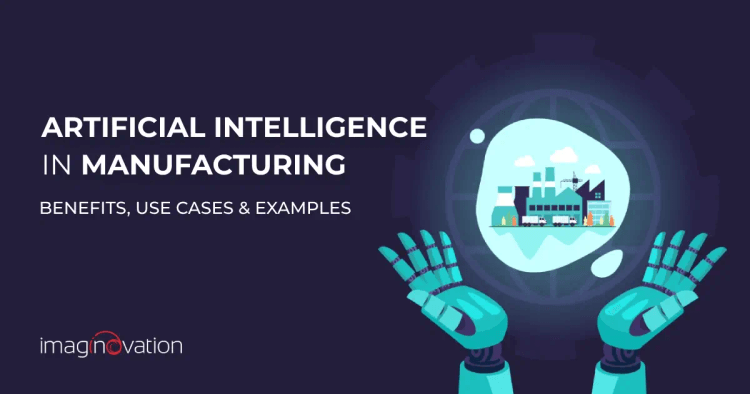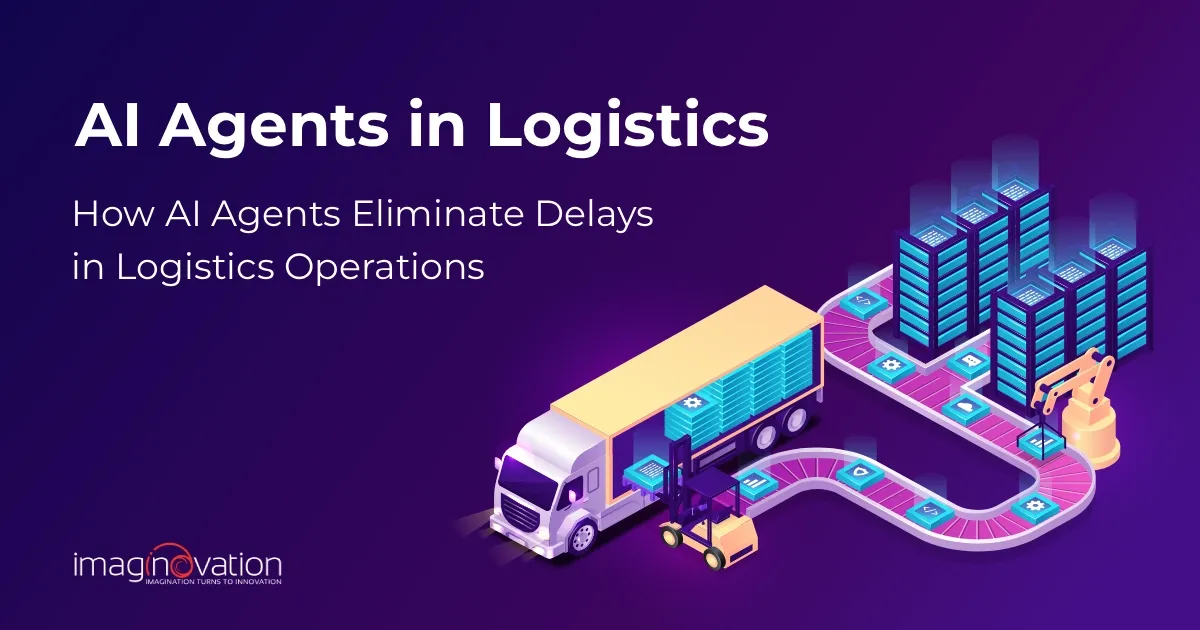To estimate the cost of building a website or an app, use our app cost calculator tool.
Artificial Intelligence (AI) has been tagged as one of the most promising technologies after the Internet.
Due to its human-like advanced decision-making ability and problem-solving skills, it doesn't come as a surprise that sectors such as manufacturing are readily adopting AI technology.
AI is making the life of manufacturing businesses easy.
In fact, it is a boon for smart manufacturing as AI not only controls and automates its core processes but also identifies defects in parts and improves the quality of manufactured products.
Through the effective use of AI algorithms, you can take your manufacturing business's productivity, efficiency, and performance to the next level.
Read this article and learn how AI is used in manufacturing. We will also check some examples of AI in manufacturing.
The Fusion of AI Intelligence and Manufacturing: An Overview
AI is the perfect fit for a sector like manufacturing, which produces a lot of data from IoT and smart factories. Manufacturers use AI, including machine learning (ML) and deep learning neural networks, to analyze this data and make better decisions.
In manufacturing, AI is primarily used in the following ways:
- Machine learning: Programs learn from data patterns without explicit programming.
- Deep learning: An advanced form of ML that interprets images and videos.
- Autonomous objects: Smart robots or vehicles that do tasks on their own.
The fusion of AI intelligence and manufacturing has brought about a transformative shift in industrial processes, leading to increased innovation across the manufacturing sector.
This convergence has enabled factories and industries to harness the power of artificial intelligence for optimizing operations, making data-driven decisions, and creating intelligent, adaptive systems.
Let's explore some of the eye-opening statistics that highlight the impact of AI in manufacturing:
- Market growth - In 2022, Artificial Intelligence in Manufacturing Market was worth about $2.3 Billion. But by 2027, it's expected to reach a massive $16.3 Billion, growing really fast with a CAGR of 47.9% every year.
- AI implementation by function - Manufacturers use AI in two major functions - maintenance (29%) and quality (27%).
- Automation Revolution - Manufacturing is witnessing a paradigm shift with automation. AI-powered robots are on the rise, and driven by advancements in AI and robotics technology, the global industrial robot market reached over 680,000 units in 2022. By 2031, the robot market could be worth $150 billion.
- Quality Enhancement - Using AI and smart image recognition to test quality makes things better. Factories can be 50% more productive. Plus, AI-driven can achieve up to 90% accuracy in detecting defects, improving overall product quality.
- Predictive Maintenance - AI-driven predictive maintenance can reduce machinery maintenance costs by up to 25%, resulting in 70% fewer breakdowns. This technology prevents costly breakdowns and optimizes maintenance schedules. (Source)
- Supply Chain Optimization - AI-powered supply-chain management helps factories do better. Early AI adopters can improve logistics costs by 15%, inventory levels by 35%, and service levels by as much as 65%.
Key Benefits of AI in Manufacturing
What are the benefits of using AI in your manufacturing business?
The list is long, but here are some of the key benefits you'll see from using robotics and artificial intelligence in manufacturing.
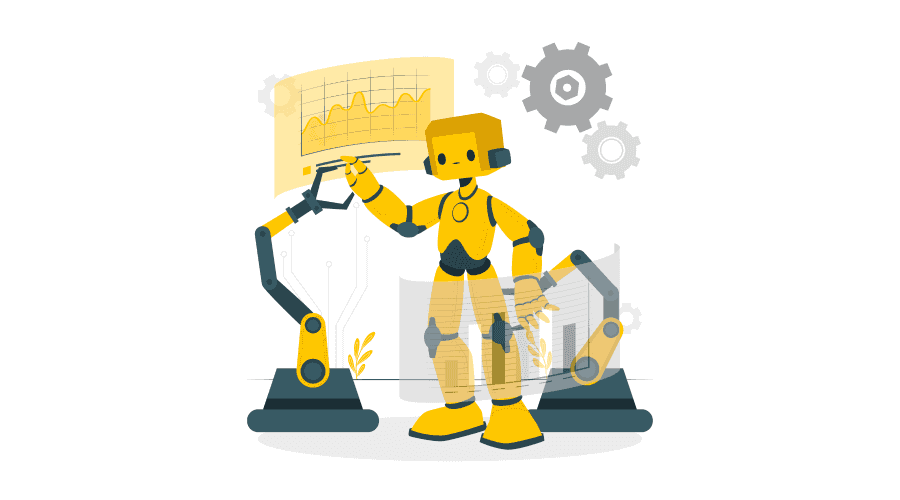
1. Predictive maintenance
AI-powered predictive maintenance utilizes machine learning, sensor data from machinery (detecting temperature, movement, vibration, etc.), and even external data like the weather.
This approach helps predict when machines might break down. It also minimizes unplanned downtime of machinery, reduces maintenance costs, and extends the lifespan of machinery.
According to the U.S. Department of Energy data, predictive maintenance can reduce machinery downtime by 35% to 45%.
2. Smart quality control
AI enables 360-degree visibility across factories and manufacturing plants, lines, and warehouses, helping users detect quality issues, reduce scrap, and improve production.
Manufacturers can increase production throughput by 20% and improve quality by as much as 35% with AI.
Moreover, AI-powered sensors can efficiently detect the tiniest of defects that are beyond the capacity of human vision. This boosts productivity and increases the percentage of items passing quality control. AI also accelerates routine processes and dramatically enhances accuracy, eliminating the need for time-consuming and error-prone human inspections.
3. Enhanced productivity
AI is great at simplifying complex calculations and coding. This eases the burden of challenging math problems.
AI can either do these tasks automatically or package them into user-friendly tools, which engineers can use to speed up their work.
With AI-driven automation, manufacturing employees save time on repetitive work, allowing them to focus on the creative aspects of their jobs, increasing job satisfaction and unlocking their full potential.
This technology boosts employee productivity by providing easy access to crucial insights. Engineers can quickly find suitable materials for specific products, and manufacturers can use reports to predict orders.
4. Generative design
Generative design is another significant benefit of AI in manufacturing. It leverages AI algorithms to explore and generate a wide range of design possibilities for various products and components.
This brings significant advantages to the manufacturing process in the form of:
- Innovative Designs - Manufacturers can propose innovative and unconventional design solutions that human designers might not have considered.
- Efficiency - It accelerates the design process by rapidly generating and evaluating numerous design alternatives, saving time and resources in product development.
- Reduced Material Waste - It helps minimize material usage by creating lightweight and efficient structures. This contributes to sustainability efforts and cost savings.
5. Better management of inventory & demand forecasting
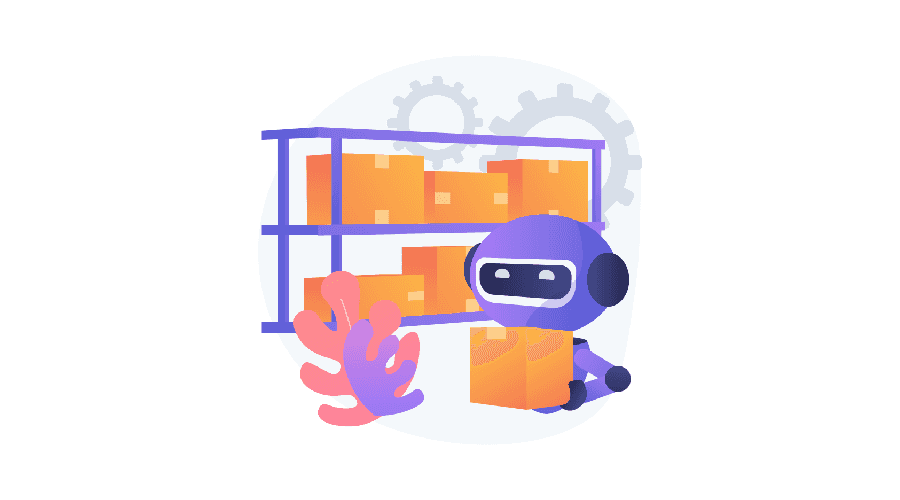
Manufacturers often struggle with having too much or too little stock, leading to losing revenue and customers. Inventory management involves many factors that are hard for humans to handle perfectly, but AI can help here.
AI's powerful calculations can help maintain the right amount of stock. It predicts demand, adjusts stock levels between locations, and manages inventory across a complex global supply chain.
As per McKinsey Digital, AI-driven forecasting reduces errors by up to 50% in supply chains.
6. Customizing the factory layouts
With hundreds and thousands of variables, designing the factory floor for maximum efficiency is complicated.
Besides, as products evolve, factory layouts should adapt as well. AI solutions offer great help here. They can spot inefficiencies in the floor layouts, clear bottlenecks, and boost output.
After changes, manufacturers can get a real-time view of the factory site traffic for quick testing without much disruption.
Use Cases of AI in Manufacturing
Once a futuristic sci-fi movie scene, factories with robot workers are now a real-life use case of manufacturers using artificial intelligence (AI) to their advantage.
AI has found diverse applications in the manufacturing industry, revolutionizing various aspects of the production process. Some notable use cases include.
Cobots
Cobots, or collaborative robots, often team up with humans, acting like extra helping hands.
Cobots learn different tasks, unlike autonomous robots that are programmed to perform a specific task. They're also skilled at identifying and moving around obstacles, which lets them work side by side and cooperatively with humans.
Manufacturers usually use cobots for tough lifting jobs or on assembly lines. For instance, in car factories, they can pick up heavy car parts and hold them while humans secure them.
Cobots are even good at finding and fetching things in big warehouses.
These robots with AI, computer vision, and learning abilities can also do other challenging tasks accurately. - For example, building things carefully and checking for their quality.
RPA for paperwork automation
AI and ML greatly help manufacturing, especially with paperwork using RPA - robotic process automation.
Factories usually have lots of papers like orders, invoices, and reports. Doing this manually takes time, and mistakes can happen, causing problems.
But with AI-powered bots, factories can automate these backend tasks. Smart robots can read documents, sort information, and put it in the right place automatically.
For instance, a car maker can use robots to handle supplier invoices. The robots read essential parts, check their correctness, and put the info in the money system. This stops people from typing important documents manually.
Development of new product
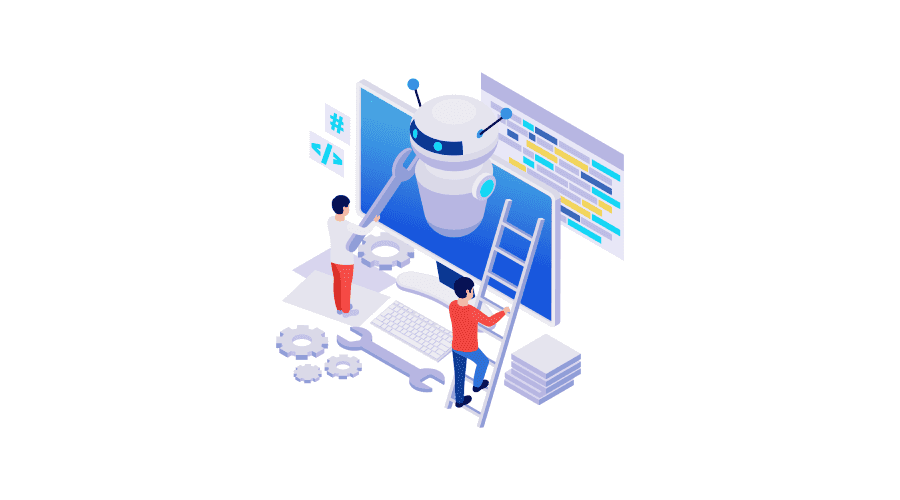
AI has changed how new products are made in factories. It helps companies come up with better ways to create and introduce new things.
One big advantage of AI is that it can quickly look at lots of data. It uses smart computer programs to learn from trends, what customers like, and what competitors do. This helps companies decide what products to make.
AI also helps engineers design new things. They tell the AI what they want, and it makes lots of options. This makes the design process faster and better.
Using AI like this helps companies make things faster and create products people really want. It also makes them better at competing and bringing new ideas to the market.
Additive manufacturing
Additive manufacturing, also called 3D printing, builds up products layer by layer. It's different from traditional manufacturing of cutting away material.
AI helps with 3D printing. It makes sure materials are used correctly and designs are good. AI can also fix design errors while printing in real-time.
Inventory/warehouse management
AI in manufacturing helps with keeping track of things in warehouses. It analyzes the historical data to check past sales, what's in stock, and trends to know how much is needed. This makes warehouses save money and have enough products.
For example, a clothing store can use AI to predict what people will buy. It looks at past sales and weather forecasts to keep the right amount of clothes. This stops them from storing too much or too little.
Also, AI makes orders go faster. It looks at orders, plans the best route to pick things, and uses resources well. This makes customers happier with fewer mistakes.
Predictive maintenance
Predictive maintenance is like predicting when things machines might break down. Instead of waiting for a problem, it checks the health of equipment and machinery and predicts their life.
This stops unexpected breakdowns and helps plan fixes.
We are aware that stopping production can cost factories a lot. AI-driven predictive maintenance is helpful because it catches even small problems that regular checks might miss.
AI tools can find issues and fix them before they cause big trouble. With smart programs, factories can predict the life expectancy of machines and get them fixed before they break.
Visual inspection
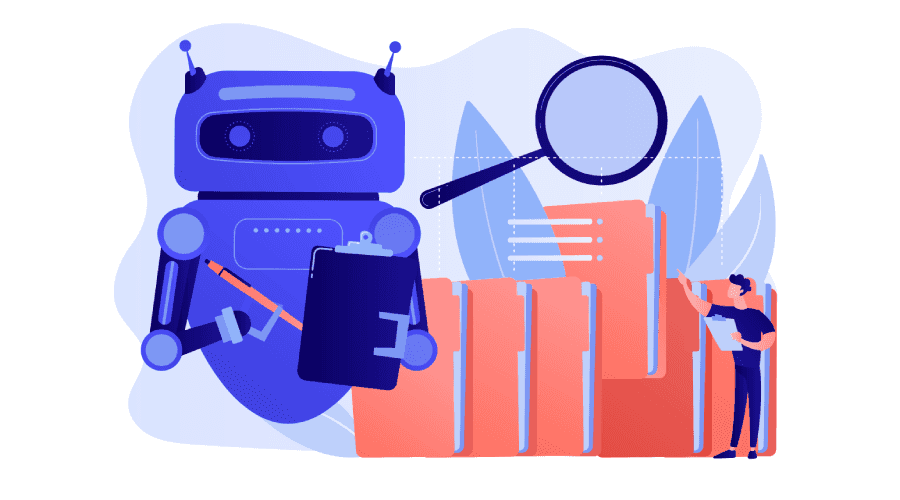
A notable use case of AI in manufacturing is visual inspection. It ensures quality assurance.
With the help of AI technology, manufacturers can employ computer vision algorithms to analyze pictures or videos of manufactured products and components.
These algorithms can smartly detect any defects, anomalies, and deviations from pre-decided quality standards with exceptional precision, surpassing human capabilities.
Real-World Examples of AI in Manufacturing
Here's a quick look at real-world examples of how AI is used in manufacturing.
1. GE uses AI to reduce product design times.
General Electric engineers have used AI technology to create tools that could make designing jet engines and power turbines much faster.
It took GE engineers around two days to analyze how fluids move in a single turbine blade or engine part design.
However, with machine learning, scientists at General Electric's research center in New York developed a model to assess a million design variations in only 15 minutes.
This helps speed up the creation of the company's next generation of products.
2. Toyota collaborates with Invisible AI.
Toyota has collaborated with Invisible AI and implemented AI to bring computer vision into their North American factories.
With this, Toyota made its manufacturing operations safer, better in quality, and more efficient. This AI solution can predict and prevent small defects and injuries by analyzing how people move.
The remarkable thing about these AI solutions is that they learn by themselves. Moreover, these devices don't need a cloud or internet connection. They're built with special technology and have a camera to watch what's happening on the floor.
3. Suntory PepsiCo streamlines its quality control in production.
Suntory PepsiCo, a company that makes beverages, has five factories in Vietnam.
Their soda factories needed help with reading labels with manufacturing and expiration dates. Sometimes, the tags got smudged because they were put on before the surface was dry. This caused delays and expensive stoppages in production.
To fix this, Suntory PepsiCo asked a company called Pacific Hi-Tech for help, and they came up with a "Machine Vision" solution.
This solution uses cameras and AI to read the labels on the products. It quickly checks if the labels are correct if they're readable, and if they're smudged or missing. If a label is wrong, a machine takes out the product from the assembly line. This happens without stopping everything. This Machine Vision System helps Suntory PepsiCo make sure they manufacture quality products.
If a human had to do this job, it would take much longer to look at each product and decide what to do. However, Al machines do this job faster and with fewer mistakes.
4. Silicon wafers get to the actual cause of their microchip defects.
Silicon wafers are semiconductors that make tiny chips for our phones, computers, and TVs. These chips can be super tiny, like 10 nanometers.
Tools like electron microscopes are used to find errors in making them, which are slow but accurate.
Even though an optical scan can find many problems on silicon wafers, it takes a long time to check them with an electron microscope. This is important because some small mistakes can make the chips not work well. These errors are called "killer" defects.
A technology called ExtractAI from Applied Materials uses AI to find these killer defects. First, it uses a special scanner to look for problems on the silicon wafers. Then, an electron microscope looks closer at the issues.
Build AI-Powered Solutions with Imaginovation
In the ever-evolving landscape of manufacturing, AI stands as the game-changer, reshaping efficiency, quality, and innovation.
From predictive maintenance to supply chain optimization, its applications are limitless.
If you're ready to harness AI's transformative power for your manufacturing needs, look no further. Imaginovation can be your partner in crafting tailor-made AI solutions.
Let's collaborate to unlock unprecedented possibilities and lead the way into a future where manufacturing knows no bounds.
Get in touch with Imaginovation today and embark on your AI-driven journey to success.
Imaginovation is an award-winning web and mobile app development company with vast experience crafting remarkable digital success stories for diverse companies.
Let's talk.





